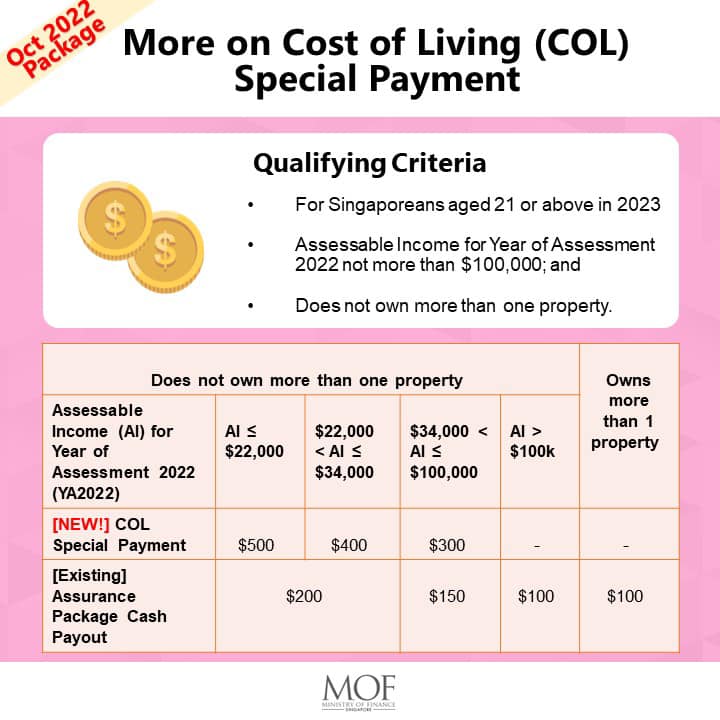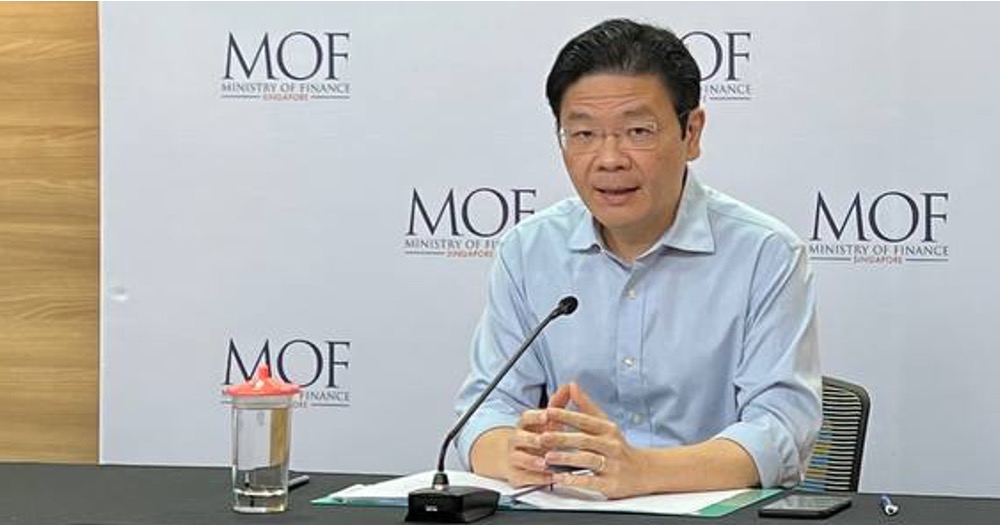Follow us on Telegram for the latest updates: https://t.me/mothershipsg
In light of rising prices, Deputy Prime Minister Lawrence Wong announced a new S$1.5 billion support package for all Singaporean households on Oct. 14.
Among the measures, which include support for lower to middle-income groups, was a Cost of Living Special Payment of up to S$500 in cash for 2.5 million eligible adult Singaporeans.
Cost of living Special Payment
This payment will be disbursed in December 2022.
It will be released together with the Assurance Package for GST cash payout, announced in the Budget earlier this year.
Eligible individuals should have an assessable income of S$100,000 and below for Year of Assessment 2022. They should also not own more than one property.
The Ministry of Finance (MOF) estimates that 2.5 million Singaporeans will benefit.
 Graphic from Ministry of Finance Facebook page.
Graphic from Ministry of Finance Facebook page.
CDC vouchers
In January 2023, every Singaporean household will receive another S$100 in CDC vouchers.
This is on top of the S$200 CDC vouchers already announced in Budget 2022 as part of the Assurance Package, which means a total of S$300 in CDC vouchers for January 2023.
The vouchers can be used at heartland shops and participating supermarkets.
The government will also allow households to donate their CDC vouchers, if they wish. More details will be provided soon.
Public transport subsidies and vouchers
S$200 million will be allocated to cover the 10.6 per cent fare increase, recently announced by the Public Transport Council, that will be carried over to future fare review exercises.
To provide additional support for lower and lower-middle income households, 600,000 public transport vouchers will be made available to resident households with a monthly household income per person of not more than S$1,600.
Each voucher is worth S$30 and can be used to top up fare cards, or buy monthly travel and concession passes.
MOE financial assistance
The Ministry of Education (MOE) will be raising the income eligibility criteria for financial assistance schemes, to help students with their education expenses.
This will take effect from Jan. 1, 2023, and applies to the MOE Financial Assistance Scheme for government and government-aided schools, specialised schools, special education MOE-funded schools and the MOE Independent School Bursary.
This will also take affect from Academic Year 2023 for government bursaries for post-secondary education institutions.
The bursary quanta for full time Institute of Technical Education (ITE) students will also be enhanced from Academic Year 2023.
Those from lower income households will benefit the most from the increase.
Support for lower and middle income Singaporeans
MOF stated that this new package, in addition to the other support packages announced earlier this year, will fully cover the increase in the cost of living for lower income households, on average.
It will also cover more than half of the cost of living for middle income households this year, on average.
The new package will be funded from the better-than-expected fiscal out-turn in the first half of FY2022, and there will be no draw on past reserves for this support package, MOF added.
During the press conference, Wong told Mothership that the support measures shouldn't worsen inflation further, even as more households have more money to spend.
"It shouldn't, because...we have designed the package specifically, as I have mentioned, to favour more the lower and middle income groups. So this is not a broad package where (we're) giving the same amount to every Singaporean, which can indeed, as you said, run the risk of having too much stimulus, too much demand, and then create more inflationary pressures.
We have not done that. We have designed the package with targeted support so that more will be provided for the lower income and the retirees, who will be disproportionately affected by inflation in the first place.
And with that in mind, by designing the package this way, we will be able to minimise the risk of this additional demand inadvertently bringing about more inflation."
Top image by Gawain Pek / Mothership.
If you like what you read, follow us on Facebook, Instagram, Twitter and Telegram to get the latest updates.
